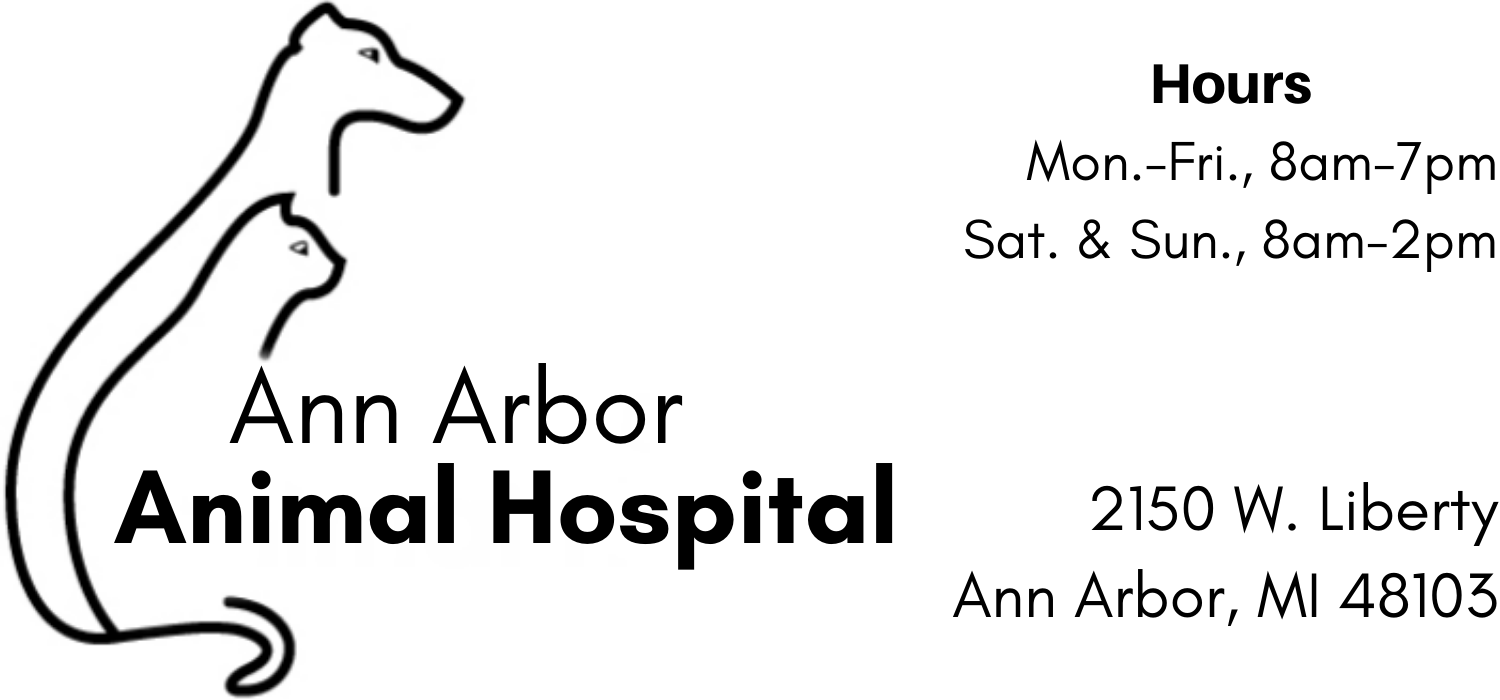Did you know your holiday décor could pose threats to your pet’s health and well-being? Here are some things to be aware of when making your home festive.
Decorations:

A typical decorated Christmas tree is loaded with potentially dangerous items:
* Dangly, sparkly objects can tempt pets, and may be especially irresistible to cats. Garland, tinsel and any string-type objects can cause linear foreign bodies in pets, acting like a drawstring to bind up the intestines, and requiring immediate surgical removal. Either avoid using this type of decoration or hang it out of reach.
* The cords of electric lights can cause electrocution and/or oral burns when chewed on. Hiding the cords as much as you can may help to prevent this.
* Ornaments may be fun to bat around, but if consumed could cause a blockage in the stomach or intestine. Another complication would be if the ornaments are made of glass or other breakable material; cut paws and mouth are not pleasant, and sharp, piercing pieces (as well as the wire hangers) passing through the intestinal tract could cause complex surgical complications.
Candles with lit, exposed flames can cause burnt whiskers or burnt noses in curious pets. Also, pets may accidentally knock over a candle, causing a fire. Options are to keep lit candles in protected containers (that surround the flame on the sides) or even use battery-operated, flameless candles.
Liquid potpourri or burning oils/waxes:
These hot liquids can burn any pet, but cats and birds can be particularly sensitive to the compounds in liquid potpourri called cationic detergents. This type of potpourri can be harmful if ingested or inhaled, and can cause irritation if it comes in contact with skin. Plug-in type diffusers (on a low setting, if it can be programmed) or unlit scented candles can be used instead. Reed diffusers may be used, but should be kept out of reach of the pet to avoid being knocked over. To be on the safe side, it is recommended that bird owners avoid use of all liquid potpourris, air fresheners, and other aerosolized products.
Gift Wrap:

While you probably don’t need to worry about wrapping paper (unless it’s a fancy metallic wrap, or your dog has an affinity for eating paper products), the bindings can cause problems if ingested. Cats are particularly attracted to bows, ribbons and strings (see the first paragraph above in “Decorations”), and care should be taken to pick up all stray objects to avoid temptations.
Holiday “Yummies”:

* Chocolate and cocoa are obvious avoidances, but many other human foods can pose potential hazards for pets.
* Fruit cakes, desserts and alcohol: Some of the common ingredients in fruitcakes, such as grapes, raisins, and currants can result in kidney failure in dogs, and possibly cats and ferrets, if ingested. If a fruitcake has been soaked in rum or other alcohol, this may lead to ethanol intoxication. If consumption of grapes, raisins and or currants is known or suspected, the immediate induction of vomiting is often advised (call your veterinarian for advice on how to induce vomiting at home, or bring your pet into your vet right away). Alcohol should not be given to pets, as it can cause neurological depression and low blood sugar.
* Candy and other sweets: Hard candies could pose a choking hazard. The wrappings of candies could also cause an intestinal blockage. Xylitol, a common substitute for sugar used in baked goods, candies, and sugar-free chewing gum, can be fatal to dogs, causing a rapid, life-threatening drop in blood sugar and possibly liver damage. Cats and people do not experience this problem.
* Baking: Bread dough can result in a bowel obstruction or a bloated or distended stomach in pets.
* Table scrap hand-outs and counter-surfing plunder: Of course we’re tempted to share holiday feast tidbits with our animal companions (guests are very prone to sneaking treats to pets!), but care should be taken with what is given. Avoid turkey and ham bones that could cause a blockage in the intestines or become lodged in the esophagus, causing a choking hazard. Any tasty wrappings from meat (plastic, Styrofoam) and fatty extras should be thrown out in a secure trash can where the pet cannot break into it; ingestion can lead to a very sick pet (may cause pancreatitis) requiring hospitalization, or intestinal blockage needing surgery (at the very least, you might end up with a mess with vomiting or diarrhea). Keep temptations off the countertops when unsupervised to avoid counter-surfing pets.
Holiday Foliage:

Many holiday-related plants can cause problems in pets when ingested. Some plants can cause a pet to become very sick (Poinsettia, American Mistletoe, Holly), and all flowers, leaves and even the pollen of the Lily family are extremely poisonous to cats (it can cause rapid kidney failure). Lilies are not really toxic to dogs, but can make them ill. Pine needles can cause irritation and vomiting, but shouldn’t cause a blockage unless a large amount of needles are consumed.
Taking some extra precautions may help to keep your pets safe and out of the ER, so that you both can enjoy the holidays to the fullest!

